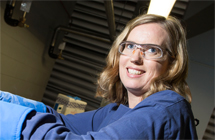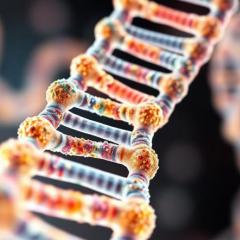
Research toward understanding the developmental risk of type 1 diabetes (T1D) is a step closer after a major funding announcement by JDRF, the world’s largest charitable funder of T1D research.
Dr Emma Hamilton-Williams from The University of Queensland Diamantina Institute has been awarded a $750,000 five-year JDRF Career Development Award for her research into identifying immune pathways responsible for causing the debilitating disease.
T1D occurs when the pancreas ceases to make insulin, a hormone produced by beta cells in the pancreas; insulin allows the body’s cells to take up glucose from the blood, and is needed to regulate the body’s carbohydrate and fat metabolism.
Australia has one of the highest rates of T1D in the world, with about 1825 Australians diagnosed each year. It is also one of the most common chronic diseases in children, and can potentially lead to temporary or permanent blindness, chronic kidney disease and amputation.
Dr Hamilton-Williams said significant advances had been made in treatments, but there is still no cure.
She and her group are researching the link between genetic and non-genetic factors which influence the development of type 1 diabetes in the hope of developing novel therapies to target those at risk.
“I’m really thrilled at this award,” Dr Hamilton-Williams said. “This is an amazing opportunity to further my goals in this critical area of type 1 diabetes research.
“Children and families with type 1 diabetes still have their hopes pinned on researchers to find a true cure for their disease. We need to do all the research we can,” she said.
It has already been discovered that there is an association between gut bacteria and several autoimmune and inflammatory diseases.
Dr Hamilton-Williams said increasing evidence also suggested a role for gut bacteria in T1D
“The composition of bacteria in the gut is influenced by both environmental and genetic factors, and my research will test whether genes that have a predisposition to an increased risk of developing type 1 diabetes alter the intestinal environment, therefore affecting the intestinal immune response, causing type 1 diabetes,” she said.
Volunteers will be recruited to observe the difference between patients with T1D and their healthy siblings and unrelated healthy individuals. The siblings have some subclinical autoimmunity and about six per cent, on average, will later develop diabetes.
“They will monitor changes in the intestine, measured by faeces samples, and the subsequent link of developing type 1 diabetes. They will work together with the proteomics team at the Diamantina Institute to screen samples to pinpoint these biomarkers.”
The team will also use DNA sequencing to assess which populations of bacteria are in the gut of the study participant. This will allow Dr Hamilton-Williams to test in pre-clinical models whether the transfer of gut bacteria from a protected individual to a genetically susceptible individual can prevent disease.
Healthy siblings of people with T1D have been shown to demonstrate inflammation in the blood cells, which is likely to represent exaggerated responses to environmental triggers such as food, infections and stress.
“While most siblings of type 1 diabetes patients don’t go on to get diabetes, I am examining which markers could predict the few that do progress to disease.
“This work may also uncover novel targets that could be used to design drugs to prevent or treat type 1 diabetes.”
Media contact:
Caroline Davy, Marketing and Communications Manager, The University of Queensland Diamantina Institute, (07) 3443 7027 or c.davy@uq.edu.au
About JDRF
JDRF is the leading global organization focused on type 1 diabetes (T1D) research. Driven by passionate, grassroots volunteers connected to children, adolescents, and adults with this disease, JDRF is now the largest charitable supporter of T1D research. The goal of JDRF research is to improve the lives of all people affected by T1D by accelerating progress on the most promising opportunities for curing, better treating, and preventing T1D. JDRF collaborates with a wide spectrum of partners who share this goal.
Since its founding in 1970, JDRF has awarded more than $1.7 billion to diabetes research. Past JDRF efforts have helped to significantly advance the care of people with this disease, and have expanded the critical scientific understanding of T1D. JDRF will not rest until T1D is fully conquered. More than 80 percent of JDRF's expenditures directly support research and research-related education.



